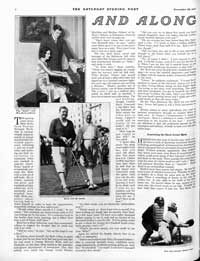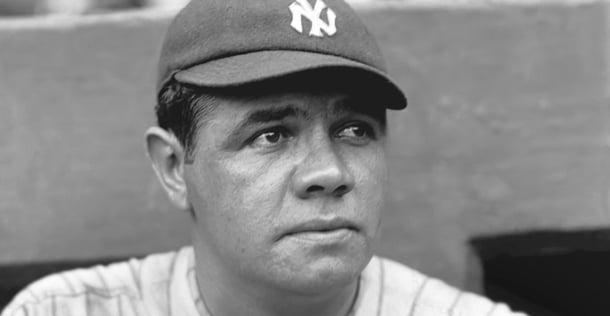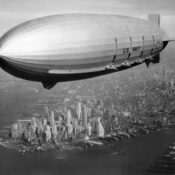August 11, 1929: Babe Ruth becomes the first ball player to hit 500 home runs.

by Bozeman Bulger
November 28, 1931
Everybody knows the Babe. The great Bambino comes up whenever fans discuss the baseball greats. Ruth was a natural—truly comfortable fielding, pitching, and (especially) hitting. His records are well-known, but his over-sized personality has been flattened over the decades. The quick glimpses we get of him today present an overweight, ungainly, crude yokel, extremely fond of beer, hot dogs, parties, and female companionship. The picture doesn’t do him justice.
In 1931, the Post offered a four-part series on the Babe, entitled “And Along Came Ruth.” It explained a lot about Ruth, including what made him a hero to America. First, though, it gets the nickname out of the way.
“ ‘In those days,’ Ruth explains, ‘Dunn [Jack Dunn, owner and manager of the Baltimore ball club] was always digging up youngsters for try-outs with his ball club. When I came out of Jack’s office after they had signed me to a baseball contract eighteen years ago, the players saw me from a distance. ‘There’s another one of Dunn’s babies,’ one of them remarked. The minute I put on a uniform they called me ‘Babe’ and, in baseball, I have never known any other name. I’m not kicking, though. I rather like it. I was such a big fellow that the nickname of ‘Babe’ struck the other boys as funny. I guess it would still be funny if we hadn’t all got used to it.”
Being called “Babe” was appropriate for George Herman Ruth Jr. Newspaper articles from the 1920s and 30s give us the impression he was very much a big kid. He enjoyed sports. He golfed and spent a lot of time watching baseball, polo, and horse racing. He enjoyed wandering around cities on a bike, cruising around in a fast car, or taking ride after ride in elevators.
He had a simple, yet sharply accurate, way of speaking, much like any street kid from the time. Once, in 1930, a reporter asked Ruth about how he could justify earning more that year than President Herbert Hoover ($80,000 to Hoover’s $75,000), since he was just a professional baseball player. Ruth replied, “What the hell has Hoover got to do with it? Besides, I had a better year than he did.”
In the off season, Ruth would also go barnstorming: playing exhibition games in farm towns. He did this more frequently than any other player at the time, and he’d put on as big of a show as possible to make sure everyone had a good time. He once said about it, “Got to be friendly with folks like that … Besides, no one could ever earn 70 or 80 thousand bucks a year by being a crab.”
“Ruth is often hard put to remember the name of his opponent, but that is no check on his friendliness. He disposes of this problem in a way that is generally satisfactory, if not perfect. All men under the age of forty are addressed by Mr. Ruth as ‘Kid.’ [pronounced “keed”] Those who have gray hair or wear spectacles are ‘Doc.’ Rarely do they fail to answer to their names.”
Early in the interview, the Post writer asked Ruth how long he expected to keep playing baseball. “I figure that about two more years ought to do me, but you can’t tell about that. You know how it is. Clarke Griffith may have been right when he said that no ball player ever voluntarily quits the game until they cut the uniform off him. Anyway, I won’t be in there until I trip on my whiskers and the boys begin feeling sorry for me. I won’t have to do that.”
The interviewer asked, “Which do you get the most thrill out of—your pitching or your hitting?” ‘That’s hard to say,’ he replied after some thought. ‘I don’t believe I could ever get anymore thrill than I did in pitching those scoreless innings in the World Series back in Boston. Still, anybody gets a big kick out of taking a cut at that ball and hitting it on the nose. Anyway, I know the public gets a bigger kick out of seeing a fellow hit ‘em than in seeing him pitch ‘em.’ ”
Ruth terminated the first interview abruptly after he checked his watch. “Listen,” he suddenly exclaimed, “I’ve got forty minutes to report at the ballpark. Always try to be on time. Young fellows seeing me late might think I’m trying to get away with something. The older and more prominent you get in baseball the closer you’ve got to follow the rules. Don’t you think so?”
Babe Ruth was a soft touch when it came to children, even tolerating kids who clung to his moving car or pressed their faces on restaurant windows just to get a glimpse of their hero. Once, in 1929, Ruth attended a World Series game in which he was not playing and found himself inundated with hundreds of eager people asking for his autograph. He obliged, but declared that once the game started, he would not sign any more autographs. When the starting batter was announced, Ruth said “No, that’s all. No more till tomorrow. None after the game either.” Then he heard a weak voice say, “I’m sorry. I had to come up on crutches and just got here.” Ruth, with more care than with all the other autographs, signed the kid’s ball after saying, “What’s that? Crutches? Well, that’s different.”
“The boys of this same nation look on Babe Ruth as a pal. They have the feeling of knowing they can meet him at the gate, can climb on his back, can clamber on the running-board of his automobile, can get him to sign a baseball. To them, Ruth is still just another boy, and he feels exactly the same way about it. His sympathetic understanding of these kids is no pose. Ruth really likes the association, and they know it instinctively. He feels it a keen responsibility to keep faith with his youthful admirers.”
Legend seemed to gather naturally around Ruth. Some of them seemed fantastic and improbably sentimental, but they were too numerous to simply be inventions. For example, the story of the handicapped boy in Florida:
“The baseball grounds in Tampa are within a race-track enclosure, the same grand stand being used for both sports. It is customary for many spectators to arrange themselves around the circular track and watch the ball game from automobiles. On this particular day a father had parked his car near the press box on the lawn, so that his little boy, almost completely paralyzed, could see Babe Ruth. The cushions were so arranged that the little boy could look over the edge of the car and see the players. At first his eyes alone expressed his interest. Finally Babe Ruth appeared to take his turn at bat.
“ ‘There he is, daddy! There he is, daddy!’ exclaimed the excited youngster. Moreover, to the astonishment of his father, the lad tried to raise himself to see better, and partially succeeded.
“It so happened that Babe Ruth hit a home run. ‘At-a-boy, Babe! At-a-boy, Babe!’ shouted the lad in the general excitement.
“The father looked around, and to his further amazement the little boy had raised himself almost to a sitting position—the first time he had been able to do such a thing for a year.
“ ‘It’s all right, son. It’s all right, son,’ cautioned the overcome father, and as he repeated the phrase he wept. ‘Lie down now. But we know you will be able to sit up! Son, you did it!’
“Ruth, hearing of the incident a few minutes later, went over and shook hands with the little boy.
“ ‘You have made him very happy, Mr. Ruth,’ said the father, ‘and I want to thank you. This is a big day in his life. It may really help him to recover.”
“ ‘Bet your life he’ll make it,’ said Ruth, ‘and more power to him.’ ”
And there’s the one about the boy in Mississippi, which could happen only in cheap fiction or real life:
“In Vicksburg one rainy morning about eight o’clock, an aged, bewhiskered man with wet clothing and muddy feet came into the lobby of the hotel. At the desk he asked for Babe Ruth. He was given the number of Ruth’s room on he second floor at the head of the steps. That hotel had not yet surrendered to the idea of visitors’ having to be announced. A few minutes later Ruth, in bed, heard at rap at his door. He grunted and got up. In night clothes and with hair tousled, the Babe went to the door.
“ ‘I’m sorry to disturb you like this, Mr. Ruth,’ the old gentleman apologized, ‘but I have come to ask of you a great favor.’
“ ‘What is it, old-timer?’ asked Ruth, somewhat puzzled, but immediately sympathetic. ‘Sit down.’
“ ‘Mr. Ruth,’ the stranger explained, ‘I want to get you to sign this baseball. It’s for a little boy out in the country—very sick. He may not get well. Ever since last Fall, when we heard that the Yankees were coming here to play a game, the little fellow has looked forward to seeing you. Now that he knows that he can’t get out of bed, his mother thinks the disappointment has made him worse. She is very much distressed. I figured out that it would help some if I could get you to sign this ball. That would at least comfort him for a while.’
“ ‘Where is the little fellow?’ asked Ruth.
“ ‘He lives out in the country about twelve miles. It was quite a trip for me, too, with all this rain and bad roads.’
“ ‘Sure, I’ll sign two or three balls for him,’ declared Ruth. ‘Not only that, but I’ll take them to him. Let’s go!’
“As the astonished old gentleman looked on, Ruth called for a bellboy, ordered a big touring car and began to get dressed. Two hours later he arrived at the little boy’s home. The mother instantly recognizing Ruth, could hardly believe her eyes. Without any preliminary conversation, she led the Babe immediately to the little fellow’s bedroom. At the expression on the little boy’s face, as he rose up in bed, the mother burst into tears.
“ ‘He’s been delirious,’ she said, ‘and he thinks he’s dreaming.’
“ ‘No, mamma,’ spoke the boy. ‘It’s Babe Ruth himself, isn’t it?’
“Ruth went over and sat on the side of the bed. Taking three baseballs from his pocket, he began signing them, all the while talking to the little fellow, as a pal, about the game. He asked about the boy’s old ball club and made several suggestions as to how they should play next summer. It was the happiest moment of that boy’s life.
“ ‘He’ll get well, all right,’ Ruth said to the mother, in the presence of the little fellow, ‘and this summer he’ll be out there hitting that baseball as hard as any of them.’
“Nobody knew of this incident … until we were aboard the train en route to Jackson that night. The writer of this happened to pick up a local afternoon paper, and on the front page found the story as just related, evidently told to the editor by the old gentleman.
“ ‘Certainly it’s true,’ said Ruth, when asked about it. ‘That as little as anybody could do, isn’t it?’
A few days later, a journalist on a big city paper wrote that he doubted the story. He boldly stated that the whole incident had been manufactured by a publicist. Ruth, who had never sought any notoriety for the incident, felt crushed by the accusation.
Babe Ruth went well beyond his 500-homer record. When he retired in 1935, he had 714 home runs to his credit. His record remained unbroken for 39 years, until the great Hank Aaron surpassed him in 1974.
The home-run record is now held by Barry Bonds, with 762 homers. Bonds’ accomplishment has been diminished by allegations of his using performance-enhancing steroids. There are no allegations, of which we know, that he has been visiting sick children and signing baseballs for them simply for the publicity.
Become a Saturday Evening Post member and enjoy unlimited access. Subscribe now




Comments
Anybody who ever broke one of the Babe’s records didn’t do it within the same parameters. i.e., number of games played, performance-enhancing drugs, etc. On top of that, his pitching records were cut short when he became an outfielder, and his hitting records were diminished by his early pitching career. The fact that many of his contemporary hall-of-famers felt that the Babe would have made the HOF as a pitcher makes him the greatest all-around player of all time, ahead of Mays, Mantle, et al. Pitching and position play in baseball are as different as Football and Basketball; noone but the Babe has mastered both. When Michael Jordan decided to try baseball, he demonstrated this difficulty. Bo Jackson made the All-Star team in both Pro Football and Baseball, but wasn’t HOF material in both. Deion Sanders established himself in Pro Football, but was a dime-a-dozen good field no-hit infielder in baseball. Jackie Robinson was an All-American College Football player and HOF baseballer, but in my opinion, falls short of the Babe’s all-around accomplishments.
The Babe was a gruff, overgrown boy with a tender heart. No more magical sports figure ever lived.
He wasn’t good-looking, he was beautiful.